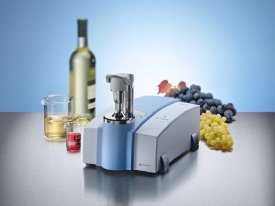Mar 23 2010
At Analytica 2010, Bruker Optics today announces a new dedicated, turn-key analyzer for the quality control of wine, based on its well-established, award-winning ALPHA Fourier transform infrared (FT-IR) spectrometer.

FT-IR spectroscopy is a popular technique that is commonly used for the quality control of wines. Compared to other wet-chemistry and separation techniques, FT-IR allows wine makers to monitor various parameters within a single measurement run.
The new ALPHA Wine Analyzer opens new dimensions for improved wine analysis, using the ATR (Attenuated Total Reflection) FT-IR sampling technique that only requires a drop of wine for analysis. Traditional infrared spectroscopy based wine analyzers have relied on transmission sampling techniques, where the results were affected by the thickness of the sample cell. FT-IR spectroscopy utilizing ATR is significantly less sensitive to particles and gas bubbles in the sample, providing more reliable and robust results.
The ALPHA Wine Analyzer, with its new measurement technique does not require any time-consuming sample preparation process, i.e. samples can be directly deposited onto the sampling area, and the results are ready in seconds. The software automatically calculates the concentration of the quality parameters such as alcohol, density, pH, various sugars and acids.
Bruker Optics collaborated with leading wineries and wine research centers all over the world to develop the start-up calibrations for the ALPHA Wine Analyzer, which can easily be adapted to individual needs. The user can optimize existing calibrations, can add new parameters to improve calibrations, or create new calibrations based on entirely new products like ‘must’, ‘must under fermentation’ or ‘finished wine’.
The ALPHA Wine Analyzer is a very compact, light-weight system that can easily be transported to different locations. The ALPHA Wine Analyzer offers a variety of operation modes: manual, semi-automated and fully automated with an autosampler. The instrument is easy to operate, offers low cost of ownership, and the cleaning of the sampling module does not require any solvents or consumables. The ALPHA can also be used in the laboratory to measure a variety of different samples like juices, oils, or even sediments and solids.